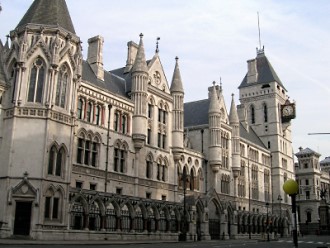Groups argue Home Office is profiteering and denying children their rights by charging fee of £1,000
A test case is being heard in the High Court today which aims to ensure children who are entitled to British citizenship are not denied it because of high government fees.
 Image credit: WikipediaThe legal challenge has been brought by an eleven-year-old girl known as VF with the support of the Project for the Registration of Children as British Citizens (PRCBC). VF is being represented by Garden Court's Amanda Weston.
Image credit: WikipediaThe legal challenge has been brought by an eleven-year-old girl known as VF with the support of the Project for the Registration of Children as British Citizens (PRCBC). VF is being represented by Garden Court's Amanda Weston.
According to Amnesty International UK, VF was born in the UK and has never left the country, but she was not born British because neither of her parents were British or entitled to reside permanently in the UK when she was born.
While VF is entitled to register for British citizenship, she was unable to do so as she could not afford the nearly £1,000 fee that the Home Office charges to register a child's citizenship.
Amnesty says the fee is made up of two parts: " Firstly, there is an amount said to reflect the cost to the Home Office of registering a child as British. In April, this amount was raised from £272 to £386. Secondly, the Home Office charges an amount over and above the cost of registration. This is now £587. The total fee, therefore, is £973."
The Home Office says the second part of the fee represents the 'benefit' to the child of citizenship, but Amnesty International UK calls that an "outrageous attempt at justification" and accuses the government of profiteering off children for around a decade.
Amnesty's Steve Valdez-Symonds said: "Children like VF are entitled to British citizenship. They are no less entitled to it than are children born in the UK to British parents. Although those children acquire British citizenship at birth and children like VF must register their citizenship, the British Nationality Act 1981 gives both sets of children the right to citizenship. It is their entitlement; and the benefit of it was given by Parliament in passing the 1981 Act."
You can follow the progress of today's case on Twitter using the hashtag #citizenshipfee.
A campaign group of young people affected by the high fees, known as Let Us Learn, is demonstrating outside the Royal Courts of Justice today in support of the challenge.
A member of the group explained: "I am supporting the court case today, which is asking the judges to say that the government is wrong to charge such high fees to children like me, before we can register as British citizens. I am 17. I was born in north London, and have lived here all my life. I have, literally, never left, not even for a holiday. Yet, the government won’t treat me as British, unless I can pay nearly £1,000 to make a citizenship application to the Home Office. The citizenship fee is far more than I can afford."
For more on the Project for the Registration of Children as British Citizens (PRCBC), see their website here.
Update, 24 November 2017: PRCBC announced that the High Court declined to rule on the lawfulness of the fee. The judge acceded to the Home Office request that the case should not proceed, as it had become ‘academic’ for the individual claimant because she had been supported by a donation from the public to pay the fee. Garden Court barrister Colin Yeo called that a "bad decision" on Twitter and said there was a clear public interest in arguments being tested affecting thousands of children.